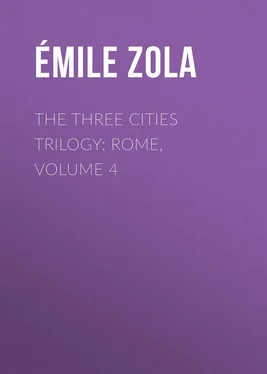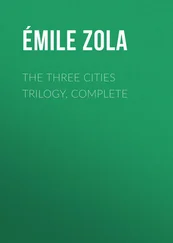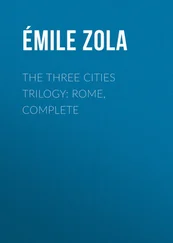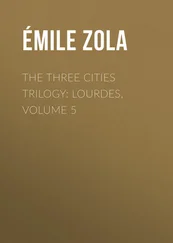Émile Zola - The Three Cities Trilogy - Rome, Volume 4
Здесь есть возможность читать онлайн «Émile Zola - The Three Cities Trilogy - Rome, Volume 4» — ознакомительный отрывок электронной книги совершенно бесплатно, а после прочтения отрывка купить полную версию. В некоторых случаях можно слушать аудио, скачать через торрент в формате fb2 и присутствует краткое содержание. Жанр: literature_19, foreign_antique, foreign_prose, на английском языке. Описание произведения, (предисловие) а так же отзывы посетителей доступны на портале библиотеки ЛибКат.
- Название:The Three Cities Trilogy: Rome, Volume 4
- Автор:
- Жанр:
- Год:неизвестен
- ISBN:нет данных
- Рейтинг книги:3 / 5. Голосов: 1
-
Избранное:Добавить в избранное
- Отзывы:
-
Ваша оценка:
- 60
- 1
- 2
- 3
- 4
- 5
The Three Cities Trilogy: Rome, Volume 4: краткое содержание, описание и аннотация
Предлагаем к чтению аннотацию, описание, краткое содержание или предисловие (зависит от того, что написал сам автор книги «The Three Cities Trilogy: Rome, Volume 4»). Если вы не нашли необходимую информацию о книге — напишите в комментариях, мы постараемся отыскать её.
The Three Cities Trilogy: Rome, Volume 4 — читать онлайн ознакомительный отрывок
Ниже представлен текст книги, разбитый по страницам. Система сохранения места последней прочитанной страницы, позволяет с удобством читать онлайн бесплатно книгу «The Three Cities Trilogy: Rome, Volume 4», без необходимости каждый раз заново искать на чём Вы остановились. Поставьте закладку, и сможете в любой момент перейти на страницу, на которой закончили чтение.
Интервал:
Закладка:
Pierre, however, had fortunately remarked what a decisive effect was produced when he had occasion to mention the name of the Assessor of the Holy Office. So it occurred to him to reply: "I most certainly do not desire to give you the slightest cause for embarrassment, Monseigneur, and I repeat to you that I would never have ventured to importune you if Monsignor Nani himself had not acquainted me with your name and address."
This time the effect was immediate, though Monsignor Fornaro, with that easy grace which he introduced into all things, made some ceremony about surrendering. He began by a demurrer, speaking archly with subtle shades of expression. "What! is Monsignor Nani the tattler! But I shall scold him, I shall get angry with him! And what does he know? He doesn't belong to the Congregation; he may have been led into error. You must tell him that he has made a mistake, and that I have nothing at all to do with your affair. That will teach him not to reveal needful secrets which everybody respects!" Then, in a pleasant way, with winning glance and flowery lips, he went on: "Come, since Monsignor Nani desires it, I am willing to chat with you for a moment, my dear Monsieur Froment, but on condition that you shall know nothing of my report or of what may have been said or done at the Congregation."
Pierre in his turn smiled, admiring how easy things became when forms were respected and appearances saved. And once again he began to explain his case, the profound astonishment into which the prosecution of his book had thrown him, and his ignorance of the objections which were taken to it, and for which he had vainly sought a cause.
"Really, really," repeated the prelate, quite amazed at so much innocence. "The Congregation is a tribunal, and can only act when a case is brought before it. Proceedings have been taken against your book simply because it has been denounced."
"Yes, I know, denounced."
"Of course. Complaint was laid by three French bishops, whose names you will allow me to keep secret, and it consequently became necessary for the Congregation to examine the incriminated work."
Pierre looked at him quite scared. Denounced by three bishops? Why? With what object? Then he thought of his protector. "But Cardinal Bergerot," said he, "wrote me a letter of approval, which I placed at the beginning of my work as a preface. Ought not a guarantee like that to have been sufficient for the French episcopacy?"
Monsignor Fornaro wagged his head in a knowing way before making up his mind to reply: "Ah! yes, no doubt, his Eminence's letter, a very beautiful letter. I think, however, that it would have been much better if he had not written it, both for himself and for you especially." Then as the priest, whose surprise was increasing, opened his mouth to urge him to explain himself, he went on: "No, no, I know nothing, I say nothing. His Eminence Cardinal Bergerot is a saintly man whom everybody venerates, and if it were possible for him to sin it would only be through pure goodness of heart."
Silence fell. Pierre could divine that an abyss was opening, and dared not insist. However, he at last resumed with some violence: "But, after all, why should my book be prosecuted, and the books of others be left untouched? I have no intention of acting as a denouncer myself, but how many books there are to which Rome closes her eyes, and which are far more dangerous than mine can be!"
This time Monsignor Fornaro seemed glad to be able to support Pierre's views. "You are right," said he, "we cannot deal with every bad book, and it greatly distresses us. But you must remember what an incalculable number of works we should be compelled to read. And so we have to content ourselves with condemning the worst /en bloc/."
Then he complacently entered into explanations. In principle, no printer ought to send any work to press without having previously submitted the manuscript to the approval of the bishop of the diocese. Nowadays, however, with the enormous output of the printing trade, one could understand how terribly embarrassed the bishops would be if the printers were suddenly to conform to the Church's regulation. There was neither the time nor the money, nor were there the men necessary for such colossal labour. And so the Congregation of the Index condemned /en masse/, without examination, all works of certain categories: first, books which were dangerous for morals, all erotic writings, and all novels; next the various bibles in the vulgar tongue, for the perusal of Holy Writ without discretion was not allowable; then the books on magic and sorcery, and all works on science, history, or philosophy that were in any way contrary to dogma, as well as the writings of heresiarchs or mere ecclesiastics discussing religion, which should never be discussed. All these were wise laws made by different popes, and were set forth in the preface to the catalogue of forbidden books which the Congregation published, and without them this catalogue, to have been complete, would in itself have formed a large library. On turning it over one found that the works singled out for interdiction were chiefly those of priests, the task being so vast and difficult that Rome's concern extended but little beyond the observance of good order within the Church. And Pierre and his book came within the limit.
"You will understand," continued Monsignor Fornaro, "that we have no desire to advertise a heap of unwholesome writings by honouring them with special condemnation. Their name is legion in every country, and we should have neither enough paper nor enough ink to deal with them all. So we content ourselves with condemning one from time to time, when it bears a famous name and makes too much noise, or contains disquieting attacks on the faith. This suffices to remind the world that we exist and defend ourselves without abandoning aught of our rights or duties."
"But my book, my book," exclaimed Pierre, "why these proceedings against my book?"
"I am explaining that to you as far as it is allowable for me to do, my dear Monsieur Froment. You are a priest, your book is a success, you have published a cheap edition of it which sells very readily; and I don't speak of its literary merit, which is remarkable, for it contains a breath of real poetry which transported me, and on which I must really compliment you. However, under the circumstances which I have enumerated, how could we close our eyes to such a work as yours, in which the conclusion arrived at is the annihilation of our holy religion and the destruction of Rome?"
Pierre remained open-mouthed, suffocating with surprise. "The destruction of Rome!" he at last exclaimed; "but I desire to see Rome rejuvenated, eternal, again the queen of the world." And, once more mastered by his glowing enthusiasm, he defended himself and confessed his faith: Catholicism reverting to the principles and practices of the primitive Church, drawing the blood of regeneration from the fraternal Christianity of Jesus; the Pope, freed from all terrestrial royalty, governing the whole of humanity with charity and love, and saving the world from the frightful social cataclysm that threatens it by leading it to the real Kingdom of God: the Christian communion of all nations united in one nation only. "And can the Holy Father disavow me?" he continued. "Are not these his secret ideas, which people are beginning to divine, and does not my only offence lie in having expressed them perhaps too soon and too freely? And if I were allowed to see him should I not at once obtain from him an order to stop these proceedings?"
Monsignor Fornaro no longer spoke, but wagged his head without appearing offended by the priest's juvenile ardour. On the contrary, he smiled with increasing amiability, as though highly amused by so much innocence and imagination. At last he gaily responded, "Oh! speak on, speak on; it isn't I who will stop you. I'm forbidden to say anything. But the temporal power, the temporal power."
Читать дальшеИнтервал:
Закладка:
Похожие книги на «The Three Cities Trilogy: Rome, Volume 4»
Представляем Вашему вниманию похожие книги на «The Three Cities Trilogy: Rome, Volume 4» списком для выбора. Мы отобрали схожую по названию и смыслу литературу в надежде предоставить читателям больше вариантов отыскать новые, интересные, ещё непрочитанные произведения.
Обсуждение, отзывы о книге «The Three Cities Trilogy: Rome, Volume 4» и просто собственные мнения читателей. Оставьте ваши комментарии, напишите, что Вы думаете о произведении, его смысле или главных героях. Укажите что конкретно понравилось, а что нет, и почему Вы так считаете.












